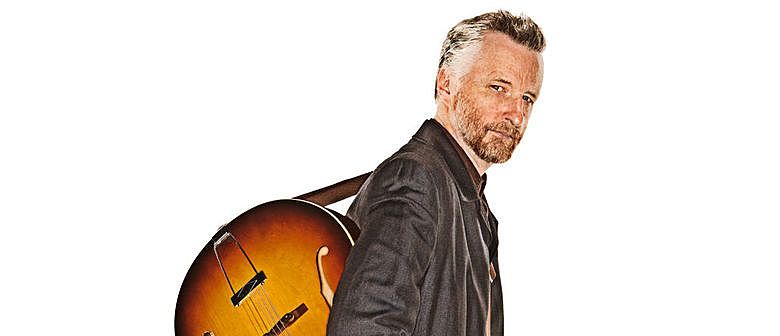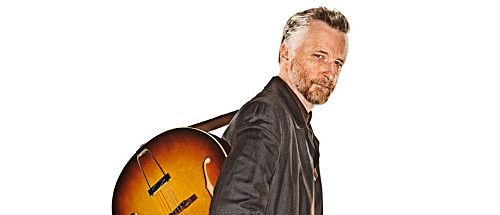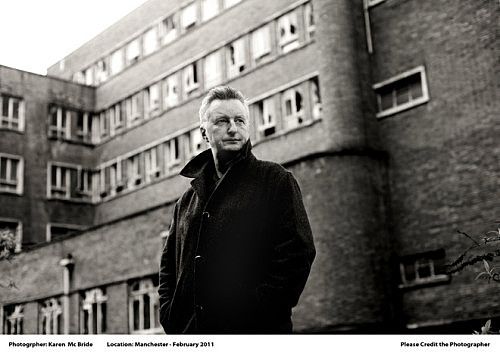Review: Billy Bragg
Billy Bragg is avowedly the second-most famous working-class anthem peddler to play in Auckland this month, for obvious reasons. But seeing him solo and with band at the Powerstation on 25th March made a compelling argument for why he's the best.
- 25 March 2013, Auckland -
It’s almost thirty years since Billy Bragg last played the Powerstation. He came here when it was called the Galaxy Bar in February 1987, having mostly played university gigs up the length of the country (NZOnScreen has him in 1987 on Radio With Pictures here). He performed in Palmerston North to a bunch of Massey vets in training, to any number of warring factions of the radical left in Wellington. When he got to Auckland, David Lange was apparently in the audience, a piece of apocrypha handed to me by my parents and reinforced by the Internet. In gigging exile from Thatcher’s England, Bragg stopped the songs to take a moment and lecture the crowd about how lucky they were to live under a Labour government, a socialist party acting for the common dignity of man, woman, and child alike. News travelled slowly back then, assumptions spread like wildfire.
This is the second time I’ve seen Bragg – the last was a solo Town Hall concert in 2012 that delved a bit too much into raconteurship for my liking. Both times, I’ve gone with my family, for the simple reason that Bragg’s output from 1983 to 1991 is encoded into my DNA, one of the few artists left on constant rotation as my parents started a family, didn’t bother to repair their record player, and lost their edge as everyone must. I like The Smiths a lot, but that’s a self-inculcated nostalgia for a band Mum and Dad never really listened to that much. Bragg is simply a complete given to me, the baying lower catches of his voice rattling through the slats of my crib, the staccato, brittle chop of his guitar punctuating long drives to pick my father from the airport in the dark as I was in the baby seat, very sad lyrics with double meanings I could not place but which made me shiver.
All of this should tell you that this is music I simply cannot offer a reliable critical account of. But in saying that, I’ve been nagged in the adult life by the realisation that Billy Bragg is deeply uncool. The voice was an absolute dealbreaker for my friends when we were listening to The Shins and fucking M. Ward in university, looking for a classless mid-Atlantic ideal ahead of our dead-cert migrations to better and more interesting lives. I can’t think of anyone beyond King Krule who’s picked up on him and meant anything of consequence, and even he’s an outlier.
More prosaically, there’s that stinging adult recognition that a traditional left-wing advocacy of trade unions, striking rights, and living wages gets seen as a form of discredited escapism (not helped by its beery, loud male advocates) and that singing about this things is even worse. Bragg’s concerts are always packed affairs, but this makes me scared – is this seething but distinctly middle-aged room it? Did he get them all, and am I just hanging on out of some generational fealty?
Tonight, he has a full band – he’s in a cowboy shirt, they’ve got pedal steel and organ. Older dudes and a bassist who could be any one of their sons, and a certain foreboding. The first 15-odd years of Bragg’s career got pegged as ‘urban folk’, but that conceals how varied his tones and influences were – pre-industrial English acapella, 50s R’n’B, music hall, The Clash. Then he made a pair of Woody Guthrie tribute albums with Wilco (Mermaid Aves I and II) and continued to approach Americana on his own political terms. Which, good on him, but US country has always felt like a comfortable set of muso tropes after a certain age, a move towards challenging yourself instrumentally within very safe parameters.
On the other hand, I tend to come away from older artists who have diligently only played their hits with a nagging sense of guilt, so I bear it out – and the positive is that the tunes from last year’s Tooth And Nail have gone back to the levity that made Mermaid Avenue (and Guthrie, obviously) so versatile. There’s a song about being crap at DIY that sounds a little like a kiss-u-back to Evan Dando’s open tribute to Bragg on his cover of “Outdoor Type”. There’s another that he introduces by unequivocally stating that political sloganeering isn’t a substitute for securing your relationships with your family and loved ones before they atrophy for good. It feels like he’s having a go at himself.
He still goes for these long, garrulous, storytelling excursions between songs – and these in themselves mist the feel of the music. I’ve realized that I’m squarely used to my performers glowering silently, mumbling awkward banter, or yelling nothing of any consequence whatsoever while I wait for them to do the next song. The notion of someone being a storyteller and musician has fallen out of fashion. And I’d be the first to run a mile if anyone dared to resurrect it as some old-timey LARPing exercise.
On the other hand, this is what Bragg’s always done. And even if it’s indulged by a loyal audience, you can see how it might have been a defense mechanism when he started out. You’re a pencil-necked boy in Barking and you’re performing to a crowd of eight, two of which are skinheads looking to give someone a hiding. You may as well crack one at their expense before you cop it.
He’s definitely your dad, though. In 2012, he did a little spiel venerating guitar music which rubbed me the wrong way; this time he’s gotten into Twitter in a big way and so he’s a bit more up on technology overall. He jokes that he’s using a foot pedal to refresh his feed and find out whether he’s trending, tells us about he found out Margaret Thatcher was dead on his smartphone while he was at a shop counter in Calgary. (““Margaret Thatcher’s dead.”, I said. She replied: “Margaret Thatcher’s alive?””)
Overt political songwriting gets treated like a bit of a niche, and I appreciate that the spectre of a gaggle of the Auckland left trading Thatcher zingers on a Tuesday night doesn’t counter that. But then he lets the band melt away and the focus shifts to his back catalogue, which makes the case for him more significant than any pigeonholing makes him out to be, even now. His attitude to the personal being political has always been holistic: his characters exist through chilling recessions and cling to wounded but defiant labour movements, but they also get drunk and mess up their relationships, worry about commitment, fall out with their friends, fuck up. But the point is that there’s characters – not slogans, not walking metaphors, not any of the other things that turn me off more dogmatically ‘political’ art (NB: none of Billy Bragg's choruses have ever been followed with an immediate "Oi" before the next verse).
Even his later work and its fuller instrumentation has a directness and concision that means that it survives the live transition. “Little Time Bomb” from 1989’s Workers Playtime works just as well without its sad social-club trumpet, while “Tank Park Salute” is simply cavernous. A song written for Bragg’s father, who died of lung cancer when the singer was only 18, its delicate arpeggio and crystalline piano bat Coldplay leagues of mega-sadness and make the case for what could have been one of the most lucrative songwriting careers in pop.
But it’s the sheer reserve in the way it’s handled here – a chord cut short into the chorus like a snapped tendon, the lyrical specificity – that showcases what makes him special. For additional various/personal reasons this is one of the only songs anywhere that can seriously threaten to move me to tears, and so seeing it live is a close call where I just have to try to look intent and attentive and a little bit skyward instead.
He leaves us with a warning not to be cynical, and it’s advice from someone who knows their audience, and it’s timely. He doesn’t mean “don’t watch Fox” – he means that we need to stop tearing strips off each other and turning social justice into a form of armchair point-scoring, to see civic participation as something to feel embarrassed over. Maybe he wasn’t so sweet on Twitter after all. We go out on his barnburner standard, “Waiting For The Great Leap Forward” – and since I didn’t mention Springsteen the entire time, I may as well do it on his most Springsteen-like stab for the epic. That concert sounded great, but with eminent respect to Doug Dillaman, there’s something intimate about an occasionally ropey Billy Bragg show that the Boss could never achieve for me.
I leave most gigs wanting to buy more music gear or possibly find an open kebab shop in between saying “yeah, that was really good”. Tonight, I feel a resolve to represent the sort of things I want to believe in and not apologise for. I usually expect the music to live up to my expectations; a night like this makes me want to live up to the music’s expectations instead.



